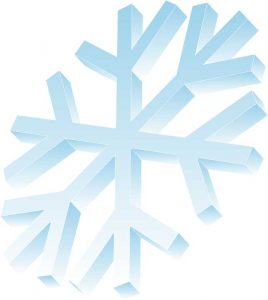Denver area residents are all too aware that snow can pop up at a moment’s notice. We can usually see snowfall starting in October and lasting into April (or May!), which is great for our ski resorts, but not for our commercial properties and homes. Knowing what types of snowfall we may see here in Colorado will help prepare an effective snow and ice risk management plan.
First, let’s start with snow itself: Did you know there are two types of snow?
 Wet snow forms and falls in altitudes where the temperature is close to the freezing point of water (32°F). Water crystals within snowflakes slightly melt and get trapped or frozen between unmelted crystals as they fall and land. This causes the snowflakes to be denser and wetter. This wet snow is heavier and compactable, making it great for snowball fights and building a snowman, but not that great for trying to clear off of roads and walkways.
Wet snow forms and falls in altitudes where the temperature is close to the freezing point of water (32°F). Water crystals within snowflakes slightly melt and get trapped or frozen between unmelted crystals as they fall and land. This causes the snowflakes to be denser and wetter. This wet snow is heavier and compactable, making it great for snowball fights and building a snowman, but not that great for trying to clear off of roads and walkways.
Colorado snow is special because it is usually dry snow. Nearly all of our snow forms and falls at high elevations where air temperatures can be far below freezing. Subfreezing conditions keep the tiny snow crystals from partially melting and combining as snowflakes settle. Because there is less liquid water content, dry snow is lighter and fluffier; this wonderful champagne “powder” snow is what makes our ski resorts world-famous. Since dry snow is difficult to pack, however, it’s not good for making snowballs or building a snowman, but it’s much easier to clear from our roads and walkways.
Depending on the particular weather patterns on a given day, we may get dry snow or wet snow. There are several different weather events that we can have during the winter here in Colorado, and being prepared for them is all part of an effective risk management plan.
- Freezing rain occurs when the layer of freezing air along the surface is so thin that raindrops don’t have enough time to freeze before reaching the ground. Instead, the water freezes after it hits the surface, creating a layer of ice on whatever the raindrops hit. A storm with freezing rain is referred to as an ice storm.
- Sleet are frozen raindrops which occurs when the layer of freezing air along the surface is thicker, causing the raindrops to freeze before reaching the ground.
- A snow flurry is snow that falls for short durations and with varying intensity, usually over a small region. Flurries usually produce little snow accumulation.
- A snowstorm generally refers to any large amount of snowfall.
Different types of snowstorms include:- A snowstorm that includes any thunder is called a thundersnow event.
- A blizzard is a severe winter storm lasting at least three hours that combines subfreezing temperatures and very strong winds (at least 35 mph) with reduced visibility of less than 0.25 miles.
- A snow squall is a sudden but intense snowfall that greatly reduces visibility (sometimes in a matter of seconds!) and is often accompanied by strong winds.
- A snowburst is an intense and usually short snow shower with greatly reduced visibility and rapid snow accumulation.
- Blowing snow is airborne snow particles blown by the wind to heights of 8 feet or more above the ground, reducing visibility.
- Drifting snow is snow on the ground that is blown into the air but staying below a height of 8 feet. Blowing snow and drifting snow will both accumulate into snowdrifts over time.
- Diamond dust (aka “clear-sky precipitation”) is a cloud composed of tiny ice crystals that forms near the ground. It’s very similar to fog, except with ice crystals instead of liquid water.
No matter what type of snow event hits or how much snow accumulates, Snow Management Services is prepared.
For over 25 years we’ve been keeping commercial properties in the Denver metro area safe and clear during Colorado’s tough winters. We offer all forms of snow and ice management services including snow plowing, off-site snow hauling, de-icing, and sidewalk clearing. Our risk management services will be able to prepare the best plan for keeping your commercial property clear of snow and ice all winter long. If you are in need of snow removal services for your commercial property, give us a call at (303) 750-8867 or contact us online today!
